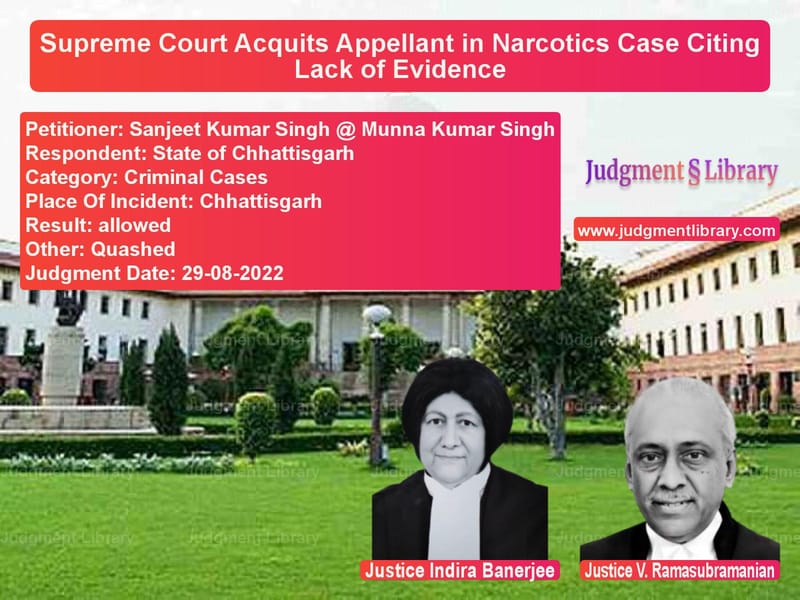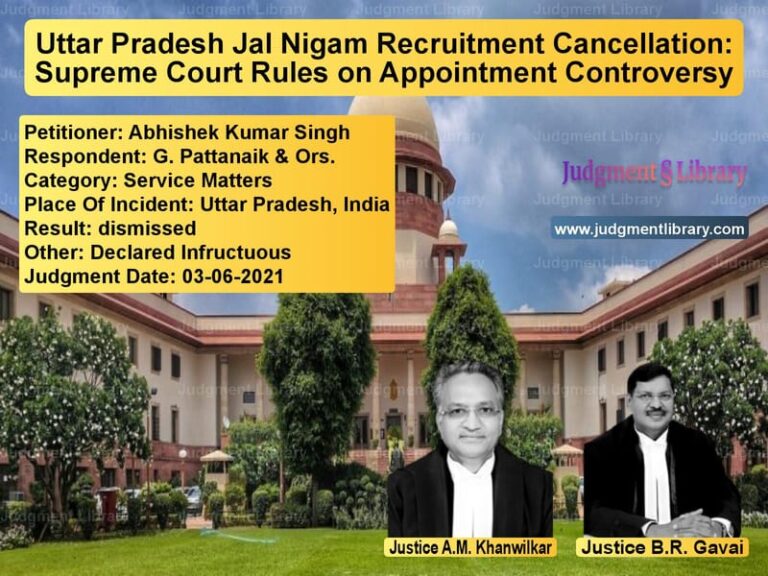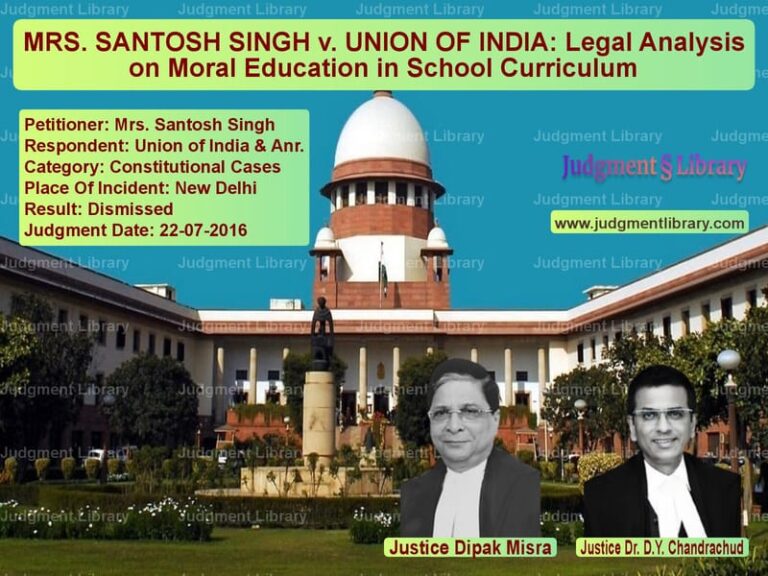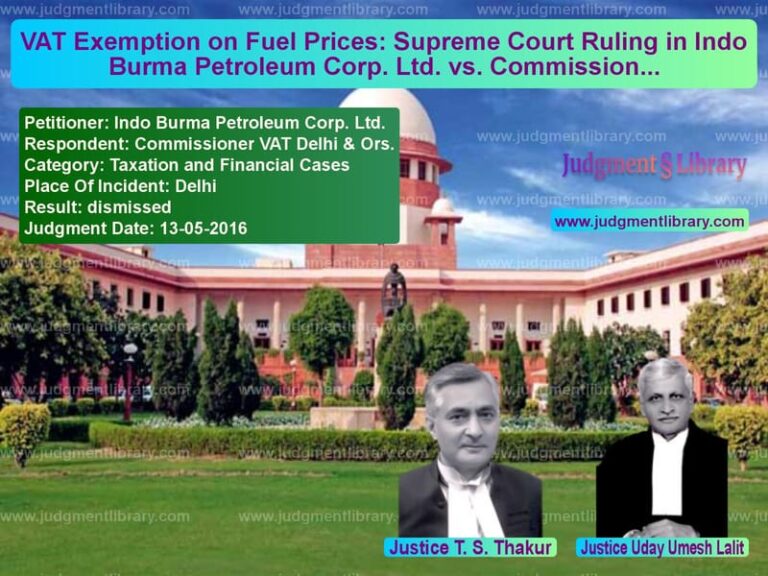Supreme Court Acquits Appellant in Narcotics Case Citing Lack of Evidence
The case of Sanjeet Kumar Singh @ Munna Kumar Singh vs. State of Chhattisgarh pertains to the conviction of the appellant under Section 20(b)(ii)(C) of the Narcotic Drugs and Psychotropic Substances (NDPS) Act, 1985. The Supreme Court, after examining the evidence and procedural lapses, acquitted the appellant, ruling that the prosecution failed to prove guilt beyond a reasonable doubt.
Background of the Case
The case originated when, on May 31, 2014, the Station House Officer (SHO) of Chakarbhata Police Station received confidential information about the appellant and his co-accused, Reena Das, transporting 47.370 kg of ganja in a car. Acting on this, the police intercepted the vehicle, conducted a search, and seized the contraband.
The appellant was subsequently arrested and charged under the NDPS Act. While the trial court convicted him and sentenced him to 10 years of rigorous imprisonment with a fine of Rs.1 lakh, his co-accused, Reena Das, was acquitted due to lack of evidence against her.
Legal Issues Before the Court
- Whether the prosecution had proven beyond a reasonable doubt that the contraband was in the exclusive possession of the appellant.
- Whether procedural requirements under the NDPS Act, particularly compliance with Sections 42, 50, and 57, were met.
- Whether the evidence presented, including the testimony of the investigating officer, was sufficient for conviction.
- Whether the acquittal of the co-accused affected the appellant’s conviction.
Arguments Presented
Petitioner’s (Appellant’s) Arguments
- The appellant argued that the informant and the investigating officer were the same, raising doubts about the fairness of the investigation.
- The independent witnesses (court witnesses 1 and 2) denied witnessing the seizure and claimed that their signatures on seizure documents were taken at the police station, not at the scene.
- The prosecution failed to establish exclusive possession of the contraband by the appellant.
- The appellant questioned the credibility of the evidence, highlighting inconsistencies in police testimonies.
Respondent’s (State of Chhattisgarh’s) Arguments
- The prosecution maintained that the contraband was recovered from the appellant’s vehicle and that he had failed to provide a reasonable explanation for its possession.
- It was argued that the investigating officer followed due procedure under the NDPS Act, and minor procedural lapses did not vitiate the case.
- The High Court had already reviewed and upheld the conviction based on the testimony of the investigating officer.
Supreme Court’s Observations
On the Role of the Investigating Officer
The Supreme Court, comprising Justice Indira Banerjee and Justice V. Ramasubramanian, scrutinized the credibility of the investigating officer’s testimony. The Court noted:
“It is a settled principle that when the investigating officer and informant are the same, extra caution must be exercised in evaluating evidence to rule out bias or procedural lapses.”
On the Testimony of Independent Witnesses
The Court emphasized that the two independent witnesses disowned their statements supporting the seizure. This significantly weakened the prosecution’s case.
“When independent witnesses deny having witnessed the seizure and claim their signatures were obtained at the police station, the burden shifts to the prosecution to establish the legitimacy of the seizure operation.”
On Compliance with NDPS Act Procedures
The Supreme Court found procedural irregularities in the seizure operation. It observed:
“Sections 42 and 50 of the NDPS Act impose strict requirements on search and seizure operations. Any non-compliance raises serious doubts about the fairness of the prosecution’s case.”
On the Acquittal of the Co-Accused
The Court found it inconsistent that while both accused were alleged to have jointly possessed the contraband, only the appellant was convicted. It stated:
“When two accused are jointly charged with the same offense and the prosecution fails to establish possession against one, the conviction of the other must be closely scrutinized.”
Judgment and Its Implications
The Supreme Court overturned the conviction of the appellant and ruled that he was entitled to the benefit of the doubt. The key directives of the judgment were:
- The appellant’s conviction and sentence were set aside.
- The appellant was to be released immediately unless required in another case.
- The judgment reaffirmed the necessity of fair investigation procedures in NDPS cases.
Significance of the Judgment
- Ensures Fair Investigation: The ruling highlights the need for impartiality in investigations under the NDPS Act.
- Emphasizes the Role of Independent Witnesses: The judgment reinforces that independent witness testimony is crucial in validating seizures.
- Prevents Misuse of NDPS Provisions: The decision serves as a safeguard against wrongful convictions based on unreliable or biased investigations.
Conclusion
The Supreme Court’s ruling in Sanjeet Kumar Singh @ Munna Kumar Singh vs. State of Chhattisgarh is a significant decision that underscores the importance of procedural safeguards in narcotics cases. By acquitting the appellant due to procedural lapses and unreliable evidence, the Court has set an important precedent for the fair application of the NDPS Act.
Petitioner Name: Sanjeet Kumar Singh @ Munna Kumar Singh.Respondent Name: State of Chhattisgarh.Judgment By: Justice Indira Banerjee, Justice V. Ramasubramanian.Place Of Incident: Chhattisgarh.Judgment Date: 29-08-2022.
Don’t miss out on the full details! Download the complete judgment in PDF format below and gain valuable insights instantly!
Download Judgment: sanjeet-kumar-singh-vs-state-of-chhattisgar-supreme-court-of-india-judgment-dated-29-08-2022.pdf
Directly Download Judgment: Directly download this Judgment
See all petitions in Drug Possession Cases
See all petitions in Bail and Anticipatory Bail
See all petitions in Judgment by Indira Banerjee
See all petitions in Judgment by V. Ramasubramanian
See all petitions in allowed
See all petitions in Quashed
See all petitions in supreme court of India judgments August 2022
See all petitions in 2022 judgments
See all posts in Criminal Cases Category
See all allowed petitions in Criminal Cases Category
See all Dismissed petitions in Criminal Cases Category
See all partially allowed petitions in Criminal Cases Category







